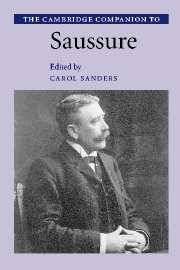Book contents
- Frontmatter
- Introduction: Saussure today
- Part I Out of the nineteenth century
- Part II The ‘Course in General Linguistics’
- Part III After the Cours
- 7 Saussure and American linguistics
- 8 Saussure and structuralist linguistics in Europe
- 9 The Russian critique of Saussure
- 10 Saussure, Barthes and structuralism
- 11 Saussure’s anagrams
- 12 Saussure and Derrida
- Part IV New debates and directions
- Notes
- Works by Saussure and further reading
- References
- Index
7 - Saussure and American linguistics
from Part III - After the Cours
Published online by Cambridge University Press: 28 May 2006
- Frontmatter
- Introduction: Saussure today
- Part I Out of the nineteenth century
- Part II The ‘Course in General Linguistics’
- Part III After the Cours
- 7 Saussure and American linguistics
- 8 Saussure and structuralist linguistics in Europe
- 9 The Russian critique of Saussure
- 10 Saussure, Barthes and structuralism
- 11 Saussure’s anagrams
- 12 Saussure and Derrida
- Part IV New debates and directions
- Notes
- Works by Saussure and further reading
- References
- Index
Summary
When William Dwight Whitney died in 1894, the American Philological Association, of which he had been co-founder and first president, asked scholars in America and Europe to contribute appraisals of his work for a memorial meeting. Professor of Sanskrit and comparative philology at Yale College, Whitney had a long and distinguished career, and his work on Sanskrit and on general linguistics reached students, scholars and even a lay readership. Absent from the many prominent linguists sending public tributes to Whitney's work was Ferdinand de Saussure. It was not that Saussure disapproved of Whitney's work. To the contrary, he was a strong proponent who 'never ceased to feel indebted to the American scholar [Whitney] and . . . when he offered courses in general linguistics at the University of Geneva, he did not fail to mention Whitney's name with praise and to discuss his ideas' (Godel, 1966: 480).
The American Philological Association had invited Saussure to contribute to the Whitney memorial, and he began a notebook for drafts and comments of what he planned to write, but he never completed the letter. The notebook, however, survived and fragments were eventually published (Godel, 1957; Engler, 1968–74; Jakobson, 1971b). From these it is clear that what Saussure most admired in Whitney was his attempt to move forward from the details of nineteenth-century comparative grammar, especially German comparative grammar, and toward generalisations about the nature of language. The new linguistic science that Whitney envisioned ‘makes the laws and general principles of speech its main subject, and uses particular facts rather as illustrations’ (Whitney, 1867: 315).
- Type
- Chapter
- Information
- The Cambridge Companion to Saussure , pp. 107 - 123Publisher: Cambridge University PressPrint publication year: 2004
- 29
- Cited by

